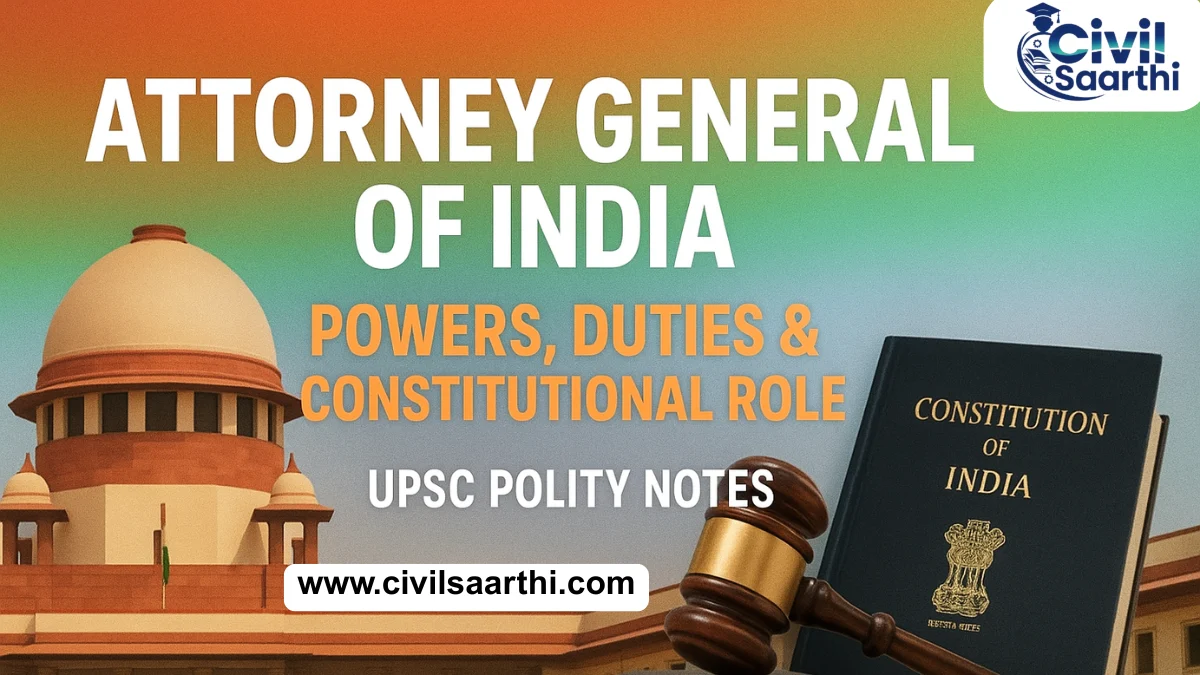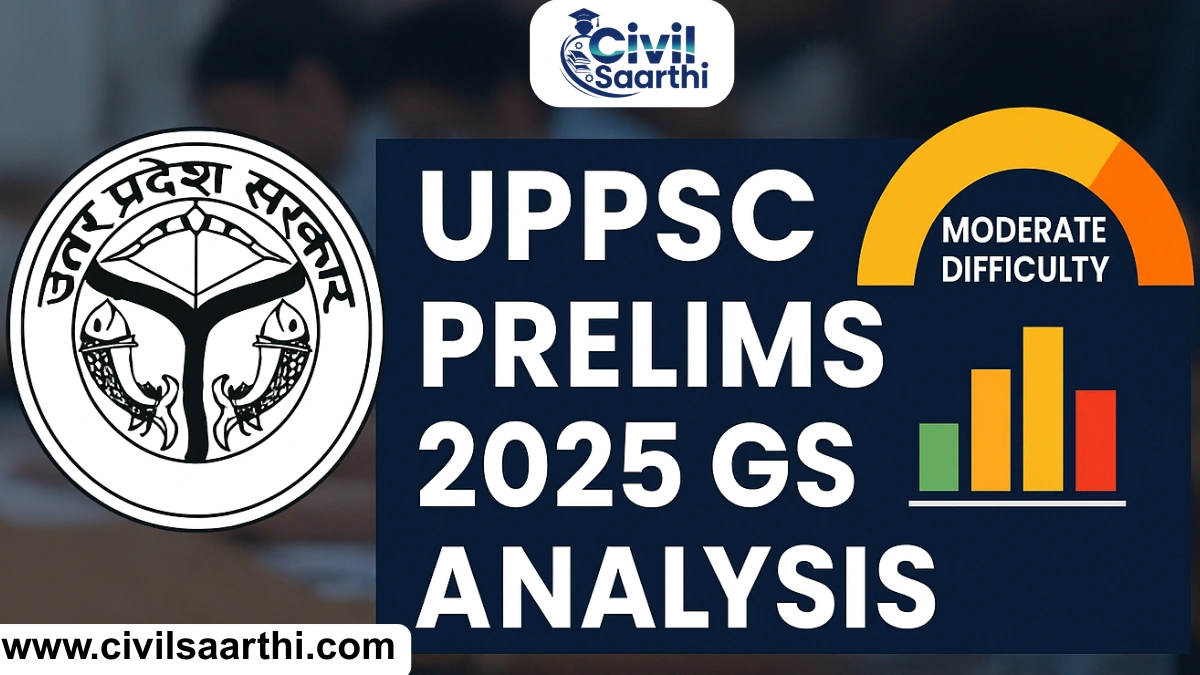The Attorney General of India (AGI) is the highest law officer in the country and the chief legal advisor to the Government of India. For UPSC aspirants, this topic holds great significance under Indian Polity and Governance, as it reflects the constitutional design of India’s legal-administrative framework. The AG ensures that the government’s actions are legally valid and constitutionally sound.
Constitutional Basis of the Attorney General of India
The post of the Attorney General is created under Article 76 of the Constitution of India. As the principal legal advisor of the Union Government, the AG acts as a vital link between the executive and the judiciary, ensuring adherence to the rule of law.
Unlike many executive offices, the AG’s tenure and service conditions are not explicitly defined in the Constitution, which gives flexibility to the executive but also raises questions about independence.
Importance of the Office of the Attorney General of India
The Attorney General is an indispensable part of India’s constitutional machinery. The office serves as the guardian of legality and constitutional propriety in the functioning of the Union Government.
Key Points of Importance:
The AG is the chief legal advisor to the Government of India, providing opinions on constitutional and legal matters.
The AG is the primary lawyer representing the Union Government before the Supreme Court and High Courts.
The AG defends the validity of Union legislation challenged in courts.
During constitutional crises or Presidential references under Article 143, the AG’s advice plays a crucial role in upholding constitutional morality.
The AG ensures that government policies, executive actions, and administrative decisions are in conformity with the law and the Constitution.
Hence, the Attorney General not only represents the Union in courts but also safeguards the integrity of governance through legal oversight.
Major Provisions Regarding Appointment, Term, and Removal
Appointment
Under Article 76(1), the President of India appoints the Attorney General. The person appointed must be qualified to be a Judge of the Supreme Court.
Qualification Criteria:
Must be a citizen of India.
Must have served as a judge of a High Court for at least five years, or
Must have practiced as an advocate in a High Court for at least ten years, or
Must be, in the opinion of the President, an eminent jurist.
Term and Tenure
The Constitution does not fix the tenure of the Attorney General.
The AG holds office during the pleasure of the President.
Therefore, the AG’s continuation depends on the confidence of the Union Government.
Removal
There is no specific procedure or ground for removal in the Constitution.
The President may remove the AG at any time, which can affect the office’s independence.
Remuneration
The President determines the AG’s remuneration and other conditions of service.
Relevant Constitutional Articles
Article 76 – Establishes the office of the Attorney General for India.
Article 88 – Grants the AG the right to speak and participate in the proceedings of both Houses of Parliament, joint sittings, and committees (without voting rights).
Article 105 – Extends parliamentary privileges, powers, and immunities to the Attorney General when participating in parliamentary business.
Article 143 – The AG represents the government in Presidential references made to the Supreme Court.
Together, these articles highlight the AG’s constitutional foundation and functional scope.
Duties and Functions of the Attorney General of India
As the chief law officer of the Government of India, the Attorney General performs both advisory and representational duties. These functions are defined by the Constitution, the President, and various statutes.
Core Duties:
Advisory Function – Advises the Government of India on legal matters referred to him by the President.
Legal Representation – Represents the Government of India in all cases before the Supreme Court and in High Courts where the Union is concerned.
Presidential Reference – Appears before the Supreme Court in any reference under Article 143 made by the President.
Assignment by the President – Performs other legal duties or functions assigned by the President.
Parliamentary Role – When invited, participates in Parliamentary discussions to clarify legal points during debates.
Assistance in Law-Making – Offers advice on drafting bills, ordinances, and constitutional amendments.
Representation in International Forums – May represent India in international legal disputes or arbitration matters.
These duties make the AG an essential part of executive decision-making and legal governance in India.
Rights of the Attorney General of India
To effectively discharge his duties, the Attorney General enjoys certain rights and privileges guaranteed by the Constitution and conventions.
Main Rights:
Right of Audience: The AG has the right to audience in all courts across India, ensuring access to any judicial forum.
Right to Participate in Parliament: Under Article 88, the AG may participate and speak in both Houses of Parliament and their committees, though without voting rights.
Right to Parliamentary Privileges: Under Article 105, the AG enjoys the same privileges and immunities as Members of Parliament while performing official functions.
Right to Access Government Information: The AG can seek any document or information necessary to perform his legal advisory duties.
These rights help the AG uphold his constitutional responsibility as the chief guardian of the government’s legal integrity.
Limitations on the Attorney General of India
Despite enjoying vast privileges, the AG is subject to several restrictions aimed at maintaining transparency and avoiding conflicts of interest.
Key Limitations:
The AG should not advise or hold a brief against the Government of India.
The AG should not appear for private clients in cases involving the Government of India.
The AG cannot defend accused persons in criminal prosecutions without the government’s permission.
The AG should not accept any directorship in companies or corporations without prior government approval.
The AG cannot advise any ministry or public sector undertaking directly; references must go through the Ministry of Law and Justice.
The AG cannot vote in Parliament even though he has the right to speak.
These limitations ensure that the office maintains ethical standards and independence while representing the Union’s legal interests.
Issues Pertaining to the Office of the Attorney General
Although constitutionally significant, the office of the Attorney General faces several institutional and ethical challenges.
1. Lack of Fixed Tenure
Since the AG holds office at the pleasure of the President, the tenure is uncertain. This dependence on the executive can affect the autonomy of the office.
2. Conflict of Interest
The AG is allowed to practice privately, which sometimes creates conflicts between personal and official responsibilities.
3. Political Influence
The AG’s appointment and removal are executive decisions, leading to perceptions of political partisanship.
4. Consent in Contempt Cases
Under the Contempt of Courts Act, 1971, the AG’s consent is required to initiate certain contempt proceedings. This discretion may be misused or influenced by political considerations.
5. Absence of Code of Conduct
There is no statutory code specifying the professional ethics or limitations of the AG’s conduct.
6. “Pleasure Doctrine” Ambiguity
The clause that the AG holds office at the “pleasure of the President” provides flexibility but reduces institutional independence.
These issues underline the need for reforms, including fixed tenure, statutory accountability, and a clearer framework for ethical standards.
Solicitor General of India and Additional Solicitor Generals
Besides the Attorney General, the Union Government is assisted by other law officers such as the Solicitor General of India and Additional Solicitor Generals.
Position and Nature
The Solicitor General (SG) is the second-highest law officer in the country, assisting the AG.
Unlike the AG, the office of the SG is not a constitutional post; it is a statutory position regulated under the Law Officers (Conditions of Service) Rules, 1987.
The Appointments Committee of the Cabinet, chaired by the Prime Minister, appoints the Solicitor General for a three-year term.
Functions of the Solicitor General
Represents the Government of India in important legal matters and court proceedings.
Provides legal opinions and assists ministries when referred through the Attorney General.
Supports the AG in managing the legal workload of the Union Government.
Does not have the right to participate in Parliament, unlike the AG.
Thus, the Solicitor General acts as the chief assistant to the AG but lacks constitutional backing.
Advocate General – The State Counterpart
At the state level, the equivalent of the Attorney General is the Advocate General, whose office is established under Article 165 of the Constitution.
Appointment and Qualification
Appointed by the Governor of the respective State.
Must be qualified to be appointed as a Judge of a High Court.
Tenure and Removal
The Advocate General holds office during the pleasure of the Governor.
The Constitution does not prescribe any specific tenure or removal procedure.
Duties and Functions
Advises the State Government on legal matters referred to him.
Represents the State Government in the High Court and Supreme Court.
Performs other legal duties assigned by the Governor or the State Executive.
Rights and Limitations
Has the right to speak and take part in proceedings of the State Legislature, though without voting rights.
Subject to similar ethical and professional limitations as the Attorney General.
Hence, the Advocate General serves as the State’s top legal advisor, mirroring the AG’s role at the Union level.
Need for Reform
Legal experts often argue that the Attorney General’s office needs structural reform to enhance independence and accountability.
Suggested Reforms:
Introduce a statutory code of conduct and ethical guidelines.
Provide a fixed tenure to ensure stability and reduce executive interference.
Restrict private practice more clearly to avoid conflicts of interest.
Establish a transparent appointment process through a collegial or parliamentary mechanism.
These reforms would strengthen the AG’s position as a non-partisan constitutional authority.
Conclusion
The Attorney General of India stands at the intersection of law, governance, and constitutionalism. As the chief legal advisor to the Union Government, the AG ensures that executive actions remain consistent with constitutional principles.
However, for this office to function with true independence and effectiveness, reforms are necessary to balance executive control with institutional autonomy. For UPSC aspirants, understanding the AG’s powers, duties, and constitutional context is crucial to mastering Indian Polity and Governance.
Prelims Practice Questions – Attorney General of India
Q1. Consider the following statements regarding the Attorney General of India:
The Attorney General of India must be a person qualified to be appointed as a Judge of the Supreme Court.
The term of the Attorney General is fixed by the Constitution for five years.
The Attorney General can participate in the proceedings of both Houses of Parliament but cannot vote.
The Attorney General is debarred from private practice.
Which of the statements given above are correct?
(a) 1 and 3 only
(b) 2 and 4 only
(c) 1, 3 and 4 only
(d) 1, 2 and 3 only
✅ Answer: (a)
Explanation:
Statement 1 is correct (Article 76).
Statement 2 is incorrect — no fixed tenure; he holds office at the pleasure of the President.
Statement 3 is correct — can participate but cannot vote.
Statement 4 is incorrect — not debarred from private practice.
Q2. Which of the following rights are available to the Attorney General of India under the Constitution?
Right of audience in all courts in India.
Right to take part in parliamentary committees of which he is a member.
Right to vote in both Houses of Parliament.
Select the correct answer using the code given below:
(a) 1 and 2 only
(b) 2 and 3 only
(c) 1 only
(d) 1, 2 and 3
✅ Answer: (a)
Explanation:
AG can participate and speak in Parliament and committees but has no right to vote.
Q3. With reference to the Attorney General of India, consider the following statements:
He is a part of the Union Executive.
His removal requires a resolution passed by both Houses of Parliament.
His remuneration is fixed by the Parliament.
Which of the statements given above is/are correct?
(a) 1 only
(b) 1 and 3 only
(c) 2 and 3 only
(d) 1, 2 and 3
✅ Answer: (a)
Explanation:
AG is part of the Union Executive (Article 53–78).
Removal is at the pleasure of the President, not by Parliament.
Remuneration is decided by the President, not Parliament.
Q4. Which of the following statements correctly differentiates between the Attorney General of India and the Solicitor General of India?
The Attorney General is a constitutional post, while the Solicitor General is a statutory post.
The Solicitor General can participate in parliamentary proceedings, while the Attorney General cannot.
Both are appointed by the President of India.
Select the correct answer:
(a) 1 only
(b) 1 and 3 only
(c) 2 and 3 only
(d) 1, 2 and 3
✅ Answer: (b)
Explanation:
AG’s office is constitutional (Article 76).
SG’s office is statutory (Law Officers Rules, 1987).
SG is appointed by the Appointing Committee of the Cabinet, not directly by the President.
Q5. Which of the following Articles of the Indian Constitution confer specific powers or privileges to the Attorney General of India?
Article 76
Article 88
Article 105
Article 110
Select the correct answer using the code given below:
(a) 1 and 2 only
(b) 1, 2 and 3 only
(c) 1 and 3 only
(d) 1, 2, 3 and 4
✅ Answer: (b)
Explanation:
Articles 76, 88, and 105 relate to appointment, participation rights, and privileges. Article 110 deals with the Money Bill, not the AG.
Q6. The Attorney General of India performs which of the following functions?
Advising the Government of India on legal matters referred by the President.
Representing the Government of India in the Supreme Court and High Courts.
Defending all criminal cases on behalf of private citizens in the Supreme Court.
Select the correct answer using the code given below:
(a) 1 only
(b) 1 and 2 only
(c) 2 and 3 only
(d) 1, 2 and 3
✅ Answer: (b)
Explanation:
AG represents the government and advises it on legal matters but does not defend private criminal cases.
Q7. Which of the following limitations is imposed on the Attorney General of India?
He cannot hold briefs against the Government of India.
He cannot appear in criminal prosecutions without the permission of the Government of India.
He cannot act as a director of a company without permission of the Government of India.
Select the correct answer using the code given below:
(a) 1 and 2 only
(b) 2 and 3 only
(c) 1 and 3 only
(d) 1, 2 and 3
✅ Answer: (d)
Explanation:
All these are limitations to avoid conflict of interest.
Q8. The Attorney General of India holds office during:
(a) A fixed term of five years.
(b) The pleasure of the President.
(c) The tenure of the Council of Ministers.
(d) The pleasure of the Prime Minister.
✅ Answer: (b)
Explanation:
AG holds office during the pleasure of the President as per Article 76(4).
Q9. The consent of the Attorney General of India is mandatory under which of the following circumstances?
(a) For initiation of impeachment motion against judges.
(b) For criminal contempt proceedings in courts.
(c) For appointment of Lokpal members.
(d) For constitutional amendment certification.
✅ Answer: (b)
Explanation:
Under the Contempt of Courts Act, 1971, AG’s consent is necessary before initiating criminal contempt proceedings in the Supreme Court.
Q10. Which one of the following correctly explains the constitutional position of the Attorney General of India?
(a) He is a member of the Cabinet.
(b) He is an independent constitutional authority like the CAG.
(c) He is the highest legal officer of the Government of India.
(d) He is subordinate to the Solicitor General.
✅ Answer: (c)
Explanation:
AG is the highest legal officer and chief legal advisor to the Union Government.
FAQs – Attorney General of India
Q1. Who appoints the Attorney General of India?
Answer: The President of India appoints the Attorney General under Article 76 of the Constitution, based on the advice of the Union Government.
Q2. What are the qualifications required to become the Attorney General of India?
Answer: The person must be qualified to be appointed as a Judge of the Supreme Court, which means:
Must be a citizen of India, and
Must have at least 5 years as a High Court judge, or 10 years as an advocate in a High Court, or
Be an eminent jurist in the opinion of the President.
Q3. Can the Attorney General of India participate in parliamentary proceedings?
Answer: Yes, under Article 88, the AG can participate in debates and discussions in both Houses of Parliament or their committees but cannot vote.
Q4. Does the Attorney General of India have a fixed tenure?
Answer: No, the AG holds office during the pleasure of the President, and the Constitution does not fix a term.
Q5. Can the Attorney General of India be removed by impeachment?
Answer: No, the AG is not removed by impeachment. The President can remove him/her at any time under the pleasure doctrine.







